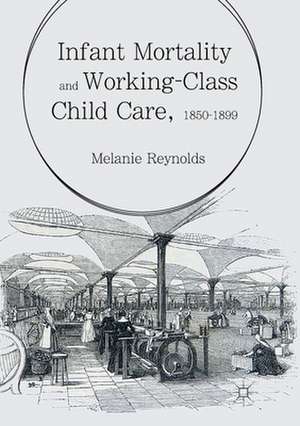Infant Mortality and Working-Class Child Care, 1850-1899
Autor Melanie Reynoldsen Limba Engleză Paperback – 8 mar 2018
| Toate formatele și edițiile | Preț | Express |
|---|---|---|
| Paperback (1) | 383.93 lei 6-8 săpt. | |
| Palgrave Macmillan UK – 8 mar 2018 | 383.93 lei 6-8 săpt. | |
| Hardback (1) | 389.49 lei 6-8 săpt. | |
| Palgrave Macmillan UK – 3 feb 2016 | 389.49 lei 6-8 săpt. |
Preț: 383.93 lei
Nou
Puncte Express: 576
Preț estimativ în valută:
73.47€ • 76.27$ • 61.26£
73.47€ • 76.27$ • 61.26£
Carte tipărită la comandă
Livrare economică 22 martie-05 aprilie
Preluare comenzi: 021 569.72.76
Specificații
ISBN-13: 9781349676545
ISBN-10: 1349676543
Pagini: 320
Ilustrații: IX, 251 p.
Dimensiuni: 148 x 210 mm
Greutate: 0.32 kg
Ediția:1st ed. 2016
Editura: Palgrave Macmillan UK
Colecția Palgrave Macmillan
Locul publicării:London, United Kingdom
ISBN-10: 1349676543
Pagini: 320
Ilustrații: IX, 251 p.
Dimensiuni: 148 x 210 mm
Greutate: 0.32 kg
Ediția:1st ed. 2016
Editura: Palgrave Macmillan UK
Colecția Palgrave Macmillan
Locul publicării:London, United Kingdom
Cuprins
Introduction
1. The Scholarship of Working-Class Women's Waged Work and their Child Care
2. Industrial Mothers
3. The Workhouse Nurse
4. The Workhouse Infant Diet
5. Day-Carers and Baby-Minders
Conclusion
1. The Scholarship of Working-Class Women's Waged Work and their Child Care
2. Industrial Mothers
3. The Workhouse Nurse
4. The Workhouse Infant Diet
5. Day-Carers and Baby-Minders
Conclusion
Recenzii
“There is much to enjoy in this thought-provoking and innovative book. Melanie Reynolds takes a common-sense approach to understanding the high infant mortality rate which prevailed in the north of England in the late nineteenth century … . Arguing that this represents a sweeping and unfair generalisation by both contemporary commentators and later historians, she uses a wealth of additional sources to examine local circumstances in areas of high infant mortality and to discuss more likely causes.” (Alison Nuttall, Social History of Medicine, Vol. 30 (1), February, 2017)
Notă biografică
Melanie Reynolds is Associate Lecturer at Oxford Brookes University, UK and was previously Tutor in History at Ruskin College. Her other publications include 'A Man Who Won't Back a Woman is No Man at All': The 1875 Heavy Woollen Dispute and the Narrative of Women's Trade Unionism' in Labour History (2006).
Textul de pe ultima copertă
Infant Mortality and Working-Class Child Care, 1850-1899 unlocks the hidden history of working-class child care during the second half of the nineteenth century, seeking to challenge those historians who have cast working-class women as feckless and maternally ignorant. By plotting the lives of northern women whilst they grappled with industrial waged work in the factory, in agriculture, in nail making, and in brick and salt works, this book reveals a different picture of northern childcare, one which points to innovative and enterprising child care models. Attention is also given to day-carers as they acted in loco parentis and the workhouse nurse who worked in conjunction with medical paediatrics to provide nineteenth-century welfare to pauper infants. Through the use of a new and wide range of source material, which includes medical and poor law history, Melanie Reynolds allows a fresh and new perspective of working-class child care to arise.
Caracteristici
Examines working-class mothers’ child caring practices in the north of England during 1850-1899 and their relationship to it Challenges existing accounts, arguing that working-class mothers were responsive and responsible towards their infants Offers a new interpretation and investigative methodology of value to researchers in history and other disciplines associated with this area













